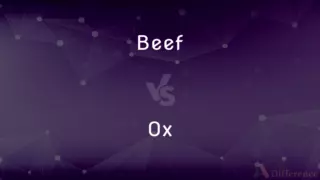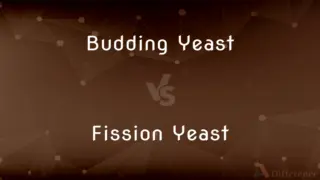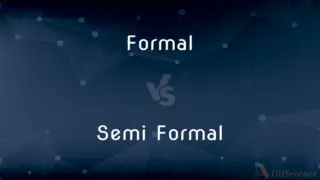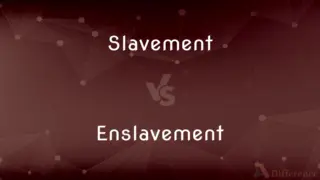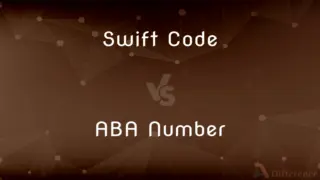Polypeptide vs. Protein — What's the Difference?
Edited by Tayyaba Rehman — By Fiza Rafique — Updated on September 24, 2023
A polypeptide is a linear chain of amino acids linked by peptide bonds. A protein is a functional biological molecule that may consist of one or more polypeptides, often folded into a specific three-dimensional shape.
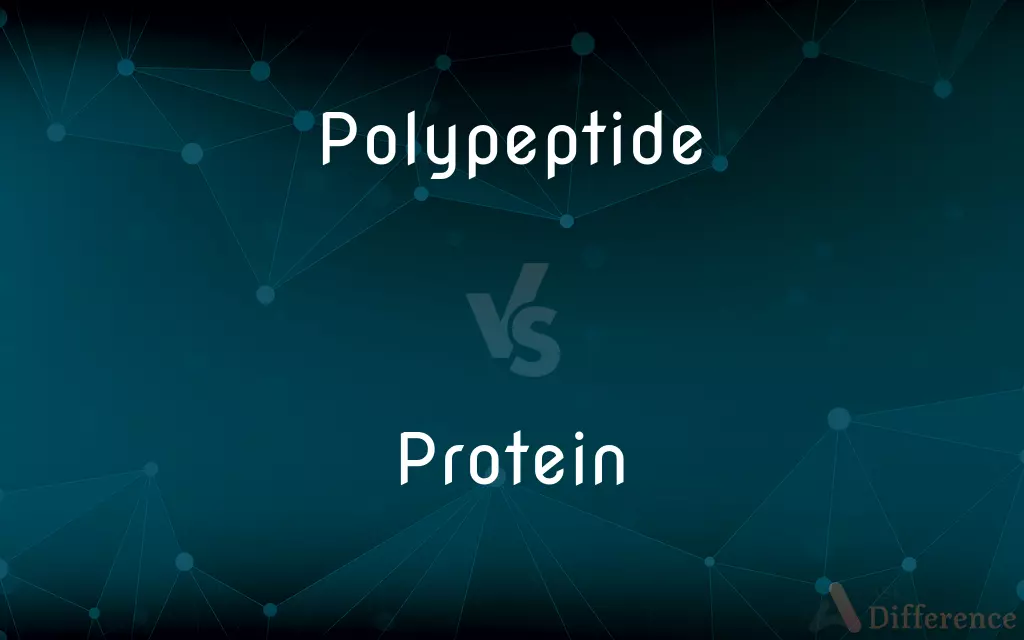
Difference Between Polypeptide and Protein
Table of Contents
ADVERTISEMENT
Key Differences
A protein, on the other hand, is a complex macromolecule that performs various functions within organisms. Proteins may consist of one or more polypeptide chains and usually have a more elaborate, three-dimensional structure that is vital for their function. They can act as enzymes, transporters, structural components, and more.
Fiza Rafique
Sep 24, 2023
A polypeptide is a long, continuous chain of amino acids connected by peptide bonds. It is a simpler structure compared to a protein and serves as the building block of proteins. Polypeptides are generally produced during the process of translation, wherein the genetic code in mRNA is read to create a chain of amino acids.
Fiza Rafique
Sep 24, 2023
In terms of complexity, polypeptides are simpler and less functional by themselves. They often require further modifications like folding, and sometimes the addition of other polypeptide chains, to become functional proteins. Proteins are the end products that carry out the work inside cells and are the main players in biological systems.
Fiza Rafique
Sep 24, 2023
From a functional standpoint, a polypeptide is typically non-functional as it is just a linear sequence of amino acids. Proteins, however, become functional entities after their polypeptide chains are folded into specific shapes, often aided by chaperone proteins, which allows them to participate in biological processes.
Fiza Rafique
Sep 24, 2023
Comparison Chart
ADVERTISEMENT
Definitions
Polypeptide
Linear chain of amino acids
A polypeptide is formed during translation in the ribosome.
Fiza Rafique
Sep 24, 2023
ADVERTISEMENT
Protein
Functional biological molecule
Enzymes are proteins that catalyze biochemical reactions.
Fiza Rafique
Sep 24, 2023
Polypeptide
Non-functional entity
A polypeptide alone cannot catalyze biochemical reactions.
Fiza Rafique
Sep 24, 2023
Protein
May contain multiple polypeptide chains
Hemoglobin is a protein with four polypeptide subunits.
Fiza Rafique
Sep 24, 2023
Polypeptide
Created through translation
The ribosome synthesizes a polypeptide based on mRNA.
Fiza Rafique
Sep 24, 2023
Protein
Participates in cellular processes
Proteins are essential for cellular structure and function.
Fiza Rafique
Sep 24, 2023
Polypeptide
Building block of proteins
Polypeptides combine to create functional proteins.
Fiza Rafique
Sep 24, 2023
Protein
Performs various biological functions
Proteins act as enzymes, hormones, and antibodies.
Fiza Rafique
Sep 24, 2023
Polypeptide
Simple molecular structure
Polypeptides lack the complex folding seen in proteins.
Fiza Rafique
Sep 24, 2023
Protein
Complex structure
A protein’s function is determined by its three-dimensional shape.
Fiza Rafique
Sep 24, 2023
Protein
Proteins are large biomolecules and macromolecules that are comprised of one or more long chains of amino acid residues. Proteins perform a vast array of functions within organisms, including catalysing metabolic reactions, DNA replication, responding to stimuli, providing structure to cells and organisms, and transporting molecules from one location to another.
Fiza Rafique
Jul 10, 2018
Polypeptide
(organic chemistry) Any polymer of (same or different) amino acids joined via peptide bonds.
Fiza Rafique
Jul 10, 2018
Protein
Any of a group of complex organic macromolecules that contain carbon, hydrogen, oxygen, nitrogen, and usually sulfur and are composed of one or more chains of amino acids. Proteins are fundamental components of all living cells and include many substances, such as enzymes, hormones, and antibodies, that are necessary for the proper functioning of an organism. They are essential in the diet of animals for the growth and repair of tissue and can be obtained from foods such as meat, fish, eggs, milk, and legumes.
Fiza Rafique
Jul 10, 2018
Polypeptide
(biochemistry) Any such polymer that is not folded into a secondary structure of a protein.
Fiza Rafique
Jul 10, 2018
Protein
Any of numerous large, complex naturally-produced molecules composed of one or more long chains of amino acids, in which the amino acid groups are held together by peptide bonds.
Amino acid
Fiza Rafique
Jul 10, 2018
Polypeptide
(protein) A small protein containing up to 100 amino acids; see also oligopeptide.
Fiza Rafique
Jul 10, 2018
Protein
One of three major classes of food or source of food energy (4 kcal/gram) abundant in animal-derived foods i.e. meat and some vegetables, such as legumes.
Fiza Rafique
Jul 10, 2018
Protein
In chemical analysis, the total nitrogenous material in vegetable or animal substances, obtained by multiplying the total nitrogen found by a factor, usually 6.25, assuming most proteids to contain approximately 16 per cent of nitrogen.
Fiza Rafique
Jul 10, 2018
Protein
Any polymer of an amino acid joined by peptide (amide) bonds. Most natural proteins have alpha-amino acids as the monomeric constituents. All classical enzymes are composed of protein, and control most of the biochemical transformations carrie dout in living cells. They may be soluble, as casein, albumins, and other globular proteins, or insoluble (e. g. "structural proteins"), as collagen or keratin. "albumin", an older term for protein, is now used primarily to refer to certain specific soluble globular proteins found in eggs or blood serum, e.g. bovine serum albumin, the main soluble protein in teh serum of cattle, used as an enzymatically inert protein in biochemical research.
Fiza Rafique
Jul 10, 2018
Protein
Any of a large group of nitrogenous organic compounds that are essential constituents of living cells; consist of polymers of amino acids; essential in the diet of animals for growth and for repair of tissues; can be obtained from meat and eggs and milk and legumes;
A diet high in protein
Fiza Rafique
Jul 10, 2018
FAQs
Are all polypeptides proteins?
No, all polypeptides are not proteins; they often need to fold into a functional form to become proteins.
Fiza Rafique
Sep 24, 2023
Do proteins have a specific shape?
Yes, proteins have a specific three-dimensional shape that dictates their function.
Fiza Rafique
Sep 24, 2023
Can a protein consist of a single polypeptide?
Yes, some proteins are made up of a single polypeptide chain.
Fiza Rafique
Sep 24, 2023
How are polypeptides formed?
Polypeptides are formed during the translation process in ribosomes.
Fiza Rafique
Sep 24, 2023
What is a protein?
A protein is a functional biological molecule with a specific function.
Fiza Rafique
Sep 24, 2023
What makes up a protein?
A protein may consist of one or more polypeptide chains.
Fiza Rafique
Sep 24, 2023
Are polypeptides functional?
Generally, polypeptides are non-functional and need to fold into proteins to gain functionality.
Fiza Rafique
Sep 24, 2023
How are proteins named?
Proteins are often named based on their function, origin, or structure.
Fiza Rafique
Sep 24, 2023
Can proteins be denatured?
Yes, proteins can lose their shape and function when denatured.
Fiza Rafique
Sep 24, 2023
Are proteins found in all living organisms?
Yes, proteins are essential components of all living cells.
Fiza Rafique
Sep 24, 2023
What do proteins do?
Proteins perform various functions like catalysis, transport, and structural support.
Fiza Rafique
Sep 24, 2023
What bonds connect amino acids in a polypeptide?
Peptide bonds connect amino acids in a polypeptide.
Fiza Rafique
Sep 24, 2023
What's the relationship between genes and proteins?
Genes contain the instructions for building proteins through the process of transcription and translation.
Fiza Rafique
Sep 24, 2023
Author Spotlight

Written by
Fiza RafiqueFiza Rafique is a skilled content editor at AskDifference.com, where she meticulously refines and enhances written pieces. Drawing from her vast editorial expertise, Fiza ensures clarity, accuracy, and precision in every article. Passionate about language, she continually seeks to elevate the quality of content for readers worldwide.

Edited by
Tayyaba RehmanTayyaba Rehman is a distinguished writer, currently serving as a primary contributor to askdifference.com. As a researcher in semantics and etymology, Tayyaba's passion for the complexity of languages and their distinctions has found a perfect home on the platform. Tayyaba delves into the intricacies of language, distinguishing between commonly confused words and phrases, thereby providing clarity for readers worldwide.


